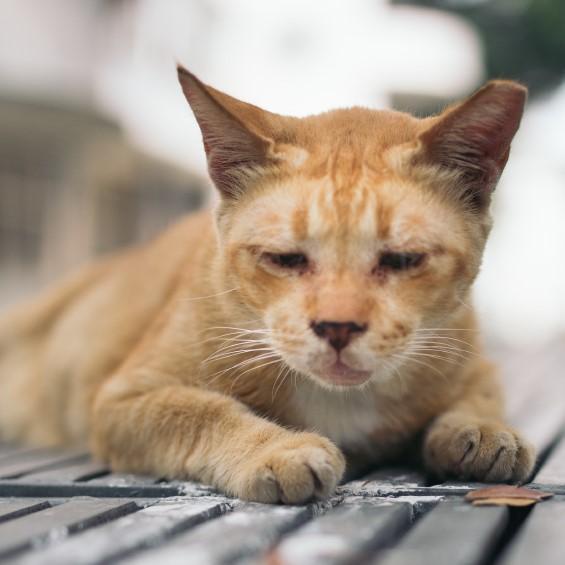Adopting a Blind Cat



See files for Cats
Blindness in cats can be either loss of partial or total vision. Either way, for a creature renowned for their visual acuity, it can be a great hindrance to their practical requirements. However, this doesn't mean they can't have a happy and fulfilled life. All it means is they need a little different consideration and perhaps an extra bit of compassion. Blindness in cats can happen for various reasons, including blood disease, cataracts or glaucoma.
The extra consideration of adopting a blind cat as opposed to a sighted cat can put some off. However, if you are considering adopting a blind cat, it is important to know they can enrich your lives just as much as any cat can. You may even find, they are well suited to your particular home set up. This is why AnimalWised looks into everything you need to know about adopting a blind cat. This includes meeting all of their practical needs as well as ensuring they are emotionally supported.
How to determine if your cat is blind
Whether adopting a kitten or an adult cat, the source from which you get them should know whether or not they are blind. However, even careful breeders and respectful shelters can sometimes miss it. This means that sometimes families will adopt a blind kitten or adult cat without knowing if they are indeed blind. Others still might adopt a cat which has degenerative sight issues so they are not blind at time of adoption, but will later discover this to be the case.
Cat owners may notice that their cat doesn't seem to be responding to visual stimuli. This can lead to fear that a cat is indeed bind. Here are some of the symptoms you should keep an eye out for:
- Easily startled (especially my audio or physical stimuli)
- Stumbling around
- Tripping over objects
- Running into objects
- Inflamed eyes
- Discolored eyes
- Large pupils which don't contract in light
- Opaque eyes
In some cases, blindness may be temporary or reversible. However, if it does turn out to be irreversible, then don't worry. A cat will be able to compensate with its other senses which are more heightened than that of other animals. Whichever it is, the only way to be sure if you adopt a cat which is blind is to take them to the veterinarian. At the vet clinic, they will be able to make a proper examination, run the appropriate tests and determine what type of blindness it may be.
Adult cats with acquired blindness will need some time to compensate for their new situation. Love, patience and reassurance is required during this time. Also, you need to make a lot of similar considerations you would make when adopting any type of cat.

Tips for caring for a blind cat
- Oral communication between you and the cat becomes paramount. When they lose their vision, you will need to speak to them much more and provide noises for your general movement so they know you are present. This is so that they aren't shocked by you if they don't see you coming in.
- Being respectful that they can't see you doesn't mean screaming or slamming doors. In general, you will need to maintain a quiet environment. This is because the cat may find it stressful if they hear a lot of noise, but cannot see their source. The result may be heightened states of stress.
- Play with your cat and stimulate their other senses regularly. Even if they cannot see them, they will be able to play with toys, but you can use their strengths. Find toys with a bell or rattle so they can stalk the noise and chase it with their ears rather than eyes.
- Spoil the cat. Your cat may find things confusing, but if they have an owner which takes care of their needs and helps them with basic assistance, then their quality of life will improve greatly. They may not be able to see that they are safe and secure, but they can sense it. By providing them with lots of love and giving them your time, you will have a special bond. However, just because they are blind, doesn't mean they don't have personal space. Like any cat, pestering them and not respecting their boundaries will have a negative impact on your relationship.

Adapting a blind cat to your home
- Avoid changes: while you may get bored of certain arrangements of furniture in your home, your cat finds reassurance when they are in the same place. They navigate their way through the home and use their tactile sense to know where to go. If you move things around a lot, they will be confused more easily and will have to adapt again to the new layout.
- Basic needs: along with not moving furniture, you will need to ensure you maintain the same reference points for their basic care needs. This means leaving the food bowl, water bowl and litter tray in the same places. If a cat needs to defecate and their litter box is not in the same place, then it can cause understandable duress. They can use their smell to find food and litter trays, but it may not be enough if it has been moved.
- Security: if you have stairs, close them off so the cat cannot fall down them. They may be happy enough to be a housecat, but if a door or window is left open, they may not be able to resist going outside. They may even simply go out by accident. Balconies and high places in particular need to be secured.
- Small details: there are lots of small things you may not think of. If you have a busy kitchen, then having their food bowl and litter box there may not be suitable as you may be more likely to accidentally tread on them. Leaving the toilet cover up might be a bad idea in case they fall in accidentally. Avoid clutter and generally be considerate.

Security for outside
You may be considerate and do your best to keep doors and windows closed. However, accidents happen and it may happen that your cat goes outside. Alternatively, you may want to bring them outside. This is fine to do if you maintain proper supervision. Secure and closed gardens are best and ensuring they are away from busy roads is imperative. You can even choose to walk them with a harness and a leash. This is helpful as the outside world can be a great way to stimulate their other senses.
Another important consideration with blind cats, but also with other cats, is chipping them. This involves placing a small microchip under their skin which can be read at a veterinary clinic. Having a collar with ID is also advisable in case those who find them are unaware of this technology.

Caring for a blind cat may seem complicated at first. However, with patience, care and a lot of love, you will see that you can have an incredible relationship where this love is reciprocated many times over. Many times it will not be the case of adopting a blind kitten. Instead, blindness can develop in elderly cats.

If you want to read similar articles to Adopting a Blind Cat, we recommend you visit our Extra care category.











